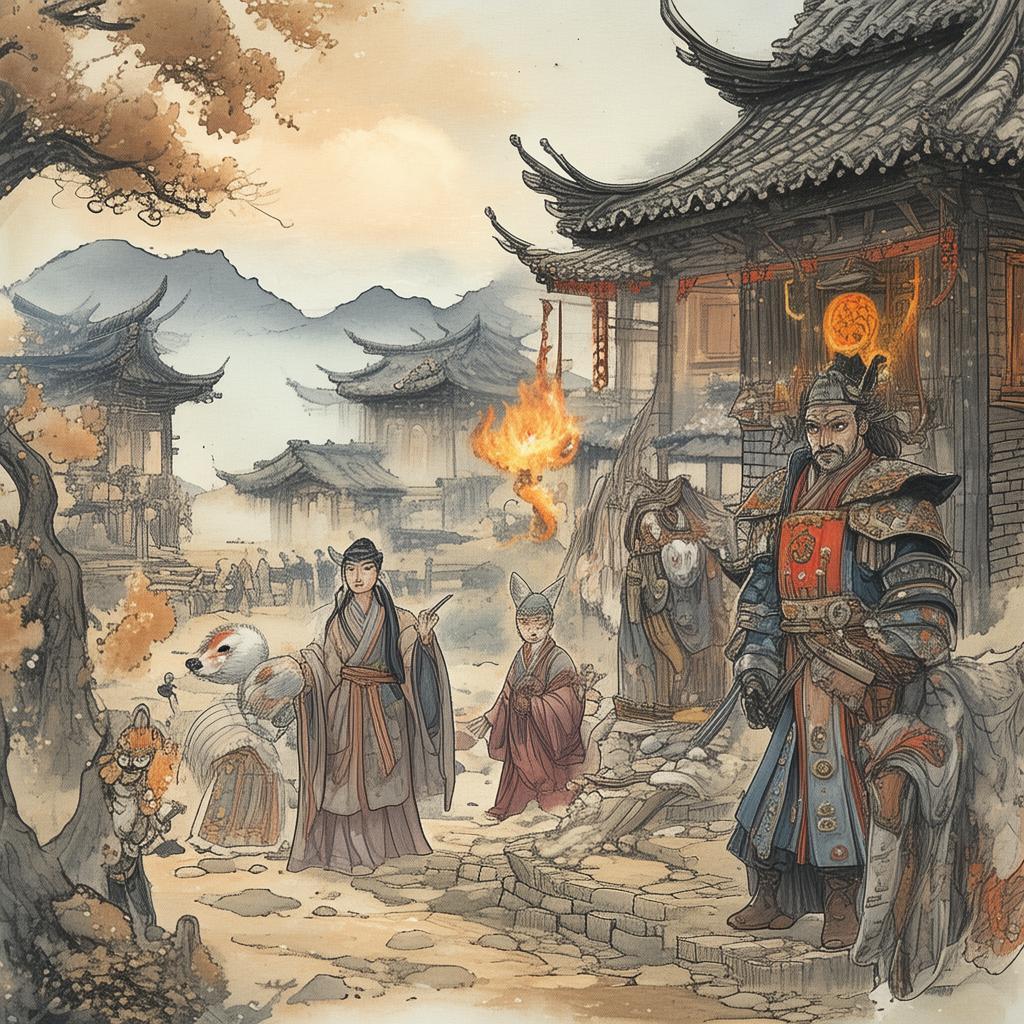Whispers of the Silk Road: The Lament of the Lost Weaver
In the bustling market of Jinhua, where the scent of tea leaves mingled with the aroma of street food, there lived a weaver named Ling. Her hands were deft, capable of weaving the most intricate patterns from the finest silk. The market buzzed with the chatter of merchants and the clink of coins, but to Ling, the world was a tapestry of her own creation.
The year was 1937, and the city of Jinhua was under siege. The Japanese army was advancing, and the air was thick with fear and uncertainty. Despite the chaos, Ling continued her work, her fingers dancing over the loom, her heart singing with the beauty of her craft.
One day, as Ling was weaving a tapestry depicting the serene landscapes of her homeland, a young soldier stumbled into her workshop. He was Japanese, his uniform tattered and his eyes weary. He spoke little Chinese, and Ling, though fluent in Japanese, found herself unable to comfort him. He had been separated from his unit and was on the run, his only hope of survival the kindness of strangers.
Ling took him in, fed him, and allowed him to sleep in the corner of her workshop. She could not forget the look of desperation in his eyes, nor the pain etched into his young face. As the days turned into weeks, Ling found herself drawn to the soldier, a man of quiet strength and an unyielding spirit.
The soldier, whose name was Taro, told her stories of his life back home, of his family and his dreams. He spoke of the beauty of his country, the mountains and rivers, and the people who loved him. Ling listened, her heart aching for the world he described, a world so different from the one she knew.
As the Japanese army advanced further into Jinhua, the city was engulfed in flames. The market, once a vibrant hub of activity, was now a haunting reminder of the war's destruction. Ling and Taro sought refuge in an old, abandoned temple, its walls cracked and its roof leaking. They shared stories and dreams, their love growing stronger with each passing day.
But the war did not spare them. The Japanese soldiers, driven by orders and the fury of war, found their way to the temple. They demanded that Taro surrender, but he refused. In a moment of madness, Taro drew his sword and fought back, but he was no match for the well-trained soldiers.
Ling watched, her heart breaking as Taro fell to the ground, his lifeblood mingling with the dust of the temple floor. She wept, her tears falling upon the ground, as the soldiers dragged Taro away. She knew she had to escape, to live and tell his story.
With the last of her strength, Ling took the tapestry she had been working on and wrapped it around her. She slipped out of the temple, her heart heavy with sorrow but her spirit unbroken. She made her way to the countryside, where she hoped to find safety.

As she wandered through the war-torn landscape, Ling encountered the remnants of her life. She saw the destruction, the loss, and the suffering. But she also saw the beauty that remained, the resilience of the people, and the enduring power of love.
Ling returned to her weaving, her hands trembling but her determination unwavering. She wove the tapestry of her love for Taro, her hands creating patterns that told his story. She called it "The Lament of the Lost Weaver," a testament to her love and the enduring spirit of those who survive the darkest of times.
The story of Ling and Taro spread through the countryside, whispered from mouth to mouth. It was a tale of love that defied the ravages of war, a love that transcended borders and languages. And as the whispers grew louder, so too did the tapestry, a symbol of hope and the enduring power of the human spirit.
In the end, Ling's story was not just about the love between her and Taro, but about the resilience of the human spirit in the face of adversity. It was a story that would be told for generations, a story that would inspire and comfort those who heard it. And in the whispers of the silk road, the tale of Ling and Taro would never be forgotten.
✨ Original Statement ✨
All articles published on this website (including but not limited to text, images, videos, and other content) are original or authorized for reposting and are protected by relevant laws. Without the explicit written permission of this website, no individual or organization may copy, modify, repost, or use the content for commercial purposes.
If you need to quote or cooperate, please contact this site for authorization. We reserve the right to pursue legal responsibility for any unauthorized use.
Hereby declared.









